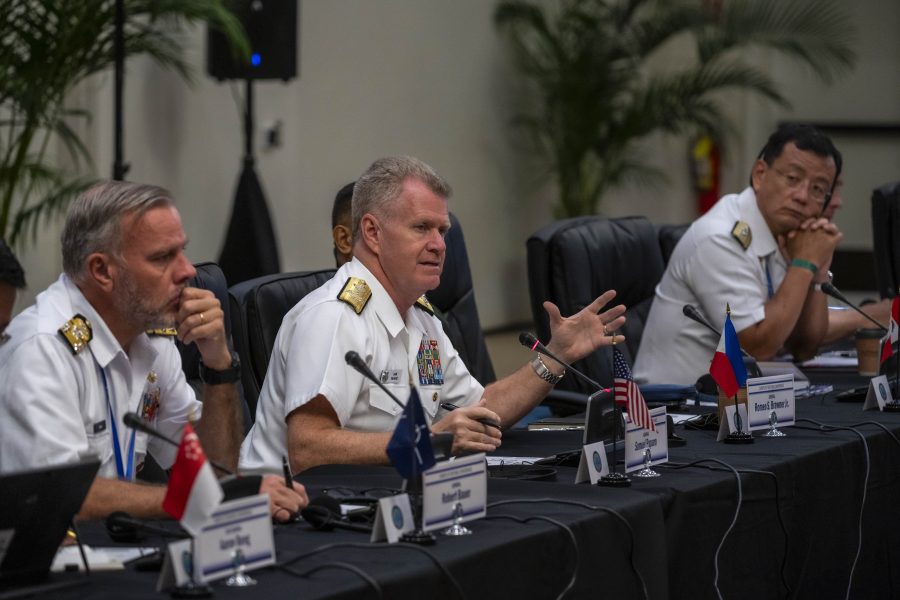The head of U.S. Indo-Pacific Command doesn’t see 2027 as a definitive date for China to invade Taiwan, nor is he concerned that the increasing frequency of provocative Chinese naval maneuvers will lead to war with the U.S. But he is concerned about U.S. readiness in the region, especially after supplying Ukraine and Israel with billions of dollars in munitions.
Adm. Samuel Paparo, speaking Nov. 19 at the Brookings Institution, said “the closer we get to 2027, the less relevant the date becomes.” At that point, China will declare itself ready” to take Taiwan by force, Paparo said—but only if certain set conditions are in place.
China’s 2005 anti-secession law, aimed at Taiwan, says it will invade only if:
- Taiwan declares its independence from China
- A third power intervenes in the dispute
- Beijing determies that “unification was irrevocably beyond its reach by any other means.”
None of those conditions are in play, Paparo said. U.S. policy is to preserve Taiwan’s “right to self-determination” he said, not necessarily to shape its governance. Moreover, Paparo argued China prefers to achieve its goals through coercion by other means instead of military conquest.
The real significance of the 2027 date was the shift in timeline for when the Chinese military had to be ready for a possible invasion, up from 2035, Paparo said.
“It was never a ‘sell-by’ date. It was never a date where the PRC had declared, ‘we’re going on this date,’” Paparo said.
Nevertheless, “I think it was a worthy benchmark to say … we had better pay close attention to this,” Paparo said. The INDOPACOM commander noted that he has to prepare his combatant command to be ready to respond every single day.
“The closer we get to it, the less relevant that date is, and the more we must be ready today, tomorrow, next month, next year, and onward,” he said.
Paparo also said he is not worried about a sudden escalation if China performs provocative maneuvers by bringing its ships and aircraft into extremely close proximity with U.S. aircraft and vessels.
“The way one controls for unintended escalation is by enhancing one’s understanding of the strategic environment or of the tactical environment,” he said. Observers have expressed concern about a scenario where “there are two vessels in close proximity to one another. They’re playing chicken on the high seas, and there is a collision. That collision results in some bravado … passions are inflamed, and this results in a conflagration with a big war.”
That scenario “does not keep me up at night,” he said, because U.S. units “are trained to be safe, to be within the rules.”
“They’re trained when making choices, to choose to be safe, because we’re a dignity culture and not an honor culture,” he said. “Nobody’s going to be out there counting coup over playing chicken. You don’t play chicken with a $2 billion warship over some transitory point of honor on the high seas. And if there were to be a collision … they’ll maneuver to a position of advantage where we’ll be in a safe position, and cooler heads can prevail. And I have that confidence in that.”
“That doesn’t mean that there’s zero chance of it,” Paparo added of a potential collision leading to greater conflict. “But I … view a very, very low probability of such a situation. I think this is the stuff of fiction.”
Other Concerns
Outside of China, Paparo was asked if North Korea—which recently tested intercontinental ballistic missiles with the range to reach the continental U.S.—has also equipped those rockets with multiple precision-guided, independently targeted reentry vehicles.
“Not yet,” he said, adding that he expects aggressive ICBM testing by North Korea to continue.
He called North Korea’s supply of weapons and now soldiers to Russia’s war on Ukraine as “dangerous and transactional.” In return, he expects North Korea will get “submarine technology and propulsion technology.”
Paparo said he is encouraged that China has voiced support for denuclearizing the Korean Peninsula, but North Korea’s rhetoric and actions “adds complexity to an already dangerous situation” and the relationship with Russia “imparts more risk on the allies”
Paparo is also worried about general readiness due to low weapon stocks, he said. The U.S. has drawn from its own supplies to arm Ukraine and Israel in recent months and deployed troops and systems amid tensions in the Middle East.
“Now with some of the Patriots that have been employed, some of the air-to-air missiles that have been employed, it’s now eating into stocks,” he said. “To say otherwise would be dishonest.”
Weapons can be “moved with alacrity to any theater—none are reserved for any theater” but “inherently it imposes costs on the readiness of America to respond in the Indo-Pacific region, which is the most stressing theater for the quantity and quality of munitions, because the [People’s Republic of China] is the most capable” potential threat.
“We should replenish those stocks and then some. I was already dissatisfied with the magazine depth” before the two conflicts erupted, and “I’m a little more dissatisfied with the magazine depth. You know, it’s a time for straight talk.”
